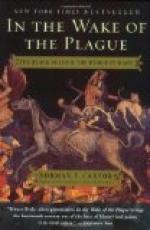INTRODUCTION TO THE DEATH-WAKE
Piscatori Piscator
An angler to an angler
here,
To one who longed
not for the bays,
I bring a little gift and
dear,
A line of love,
a word of praise,
A common memory of the ways,
By Elibank and
Yair that lead;
Of all the burns, from all
the braes,
That yield their
tribute to the Tweed.
His boyhood found the waters
clean,
His age deplored
them, foul with dye;
But purple hills, and copses
green,
And these old
towers he wandered by,
Still to the simple strains
reply
Of his pure unrepining
reed,
Who lies where he was fain
to lie,
Like Scott, within
the sound of Tweed._
A.L.
INTRODUCTION
The extreme rarity of The Death-Wake is a reason for its republication, which may or may not be approved of by collectors. Of the original edition the Author says that more than seventy copies were sold in the first week of publication, but thereafter the publisher failed in business. Mr. Stoddart recovered the sheets of his poem, and his cook gradually, and perhaps not injudiciously, expended them for domestic purposes.
Apart from its rarity, The Death-Wake has an interest of its own for curious amateurs of poetry. The year of its composition (1830) was the great year of Romanticisme in France, the year of Hernani, and of Gautier’s gilet rouge. In France it was a literary age given to mediaeval extravagance, to the dagger and the bowl, the cloak and sword, the mad monk and the were-wolf; the age of Petrus Borel and MacKeat, as well as of Dumas and Hugo. Now the official poetry of our country was untouched by and ignorant of the virtues and excesses of 1830. Wordsworth’s bolt was practically shot; Sir Walter was ending his glorious career; Shelley and Byron and Keats were dead, and the annus mirabilis of Coleridge was long gone by. Three young poets of the English-speaking race were producing their volumes, destined at first to temporary neglect. The year 1830 was the year of Mr. Tennyson’s Poems, chiefly Lyrical, his first book, not counting Poems by Two Brothers. It was also the year of Mr. Browning’s Pauline (rarer even than The Death-Wake); and it was the year which followed the second, and perhaps the most characteristic, poetical venture of Edgar Allan Poe. In Mr. Tennyson’s early lyrics, and in Mr. Poe’s, any capable judge must have recognised new notes of romance. Their accents are fresh and strange, their imaginations dwell in untrodden regions. Untouched by the French romantic poets, they yet unconsciously reply to their notes, as if some influence in the mental air were at work on both sides of the Channel, on both sides of the Atlantic.




